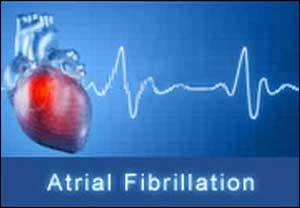- Home
- Editorial
- News
- Practice Guidelines
- Anesthesiology Guidelines
- Cancer Guidelines
- Cardiac Sciences Guidelines
- Critical Care Guidelines
- Dentistry Guidelines
- Dermatology Guidelines
- Diabetes and Endo Guidelines
- Diagnostics Guidelines
- ENT Guidelines
- Featured Practice Guidelines
- Gastroenterology Guidelines
- Geriatrics Guidelines
- Medicine Guidelines
- Nephrology Guidelines
- Neurosciences Guidelines
- Obs and Gynae Guidelines
- Ophthalmology Guidelines
- Orthopaedics Guidelines
- Paediatrics Guidelines
- Psychiatry Guidelines
- Pulmonology Guidelines
- Radiology Guidelines
- Surgery Guidelines
- Urology Guidelines
Treatment of atrial fibrillation with ablation reduces death, stroke risk

The use of catheter-based ablation instead of medications alone reduces the risk of stroke and death in patients hospitalized with nonvalvular atrial fibrillation (NVAF), shows a new study published in the journal Circulation: Arrhythmia and Electrophysiology.
Uma Srivatsa, professor of cardiovascular medicine at UC Davis Health, and colleagues compared stroke and mortality among patients undergoing ablation for AF to matched controls in a large multiethnic population.
Currently, ablation is only recommended when medications for AF don't work or are not well tolerated.
"Less than 2 percent of patients undergo ablation early in the course of AF when the procedure can be most beneficial," said Dr. Srivatsa. Our study shows that ablation may be considered as a primary treatment for everyone with the condition."
Part of the hesitation to use ablation earlier and more often could be because comparative outcomes research so far has produced inconsistent results. Most of those studies focused on single centers or were controversial in terms of patient selection and crossover, according to Srivatsa.
This study addresses these limitations by evaluating outcomes for AFib treatment over a long period of time and for large numbers of multi-ethnic patients with similar health statuses.
"It's only with more robust, real-world studies like ours that we'll be able to develop a clear picture of what works best in addressing clinical outcomes for AF patients," Srivatsa said.
Atrial fibrillation is diagnosed when the heart beats inconsistently due to uncoordinated signals between its upper chambers. The condition can cause lightheadedness, fatigue, shortness of breath and chest pain, and is associated with increased death and stroke risk.
Read Also: Catheter Ablation found better than Pharmacological Therapies in atrial fibrillation
Medications can help in reduction of AF symptoms and risks by controlling heart rhythm and rate by reducing blood clots. Ablation is a more long-term solution that involves the use of heat or extreme cold to destroy the heart tissue responsible for the faulty electrical signals, reducing the need for rhythm-control medications.
For the study, the researchers evaluated medical records from the California Office of Statewide Health Planning and Development for AF patients hospitalized between 2005 and 2013. Two groups of about 4,000 each were compared: one that was treated with ablation and another that was not. The groups were matched in terms of AFib patterns and prior hospitalizations.
Outcomes for both groups were similar in terms of rates of death, ischemic stroke and hemorrhagic stroke within 30 days of hospitalization. Beyond 30 days, however, the benefits of ablation were apparent:
- 84 patients in the ablation group died, versus 189 in the control group
- 55 patients in the ablation group had ischemic strokes, versus 86 in the control group
- 17 patients in the ablation group had hemorrhagic strokes, versus 53 in the control group
The study confirms the overall short- and long-term safety of ablation as an AFib treatment, according to Srivatsa.
"In this large population-based, matched multivariate analysis of hospitalized patients with a diagnosis of NVAF undergoing ablation, the risk of adverse outcomes after ablation was lower for death, ischemic stroke, and hemorrhagic stroke than observed in nonablated patients," concluded the authors.

Disclaimer: This site is primarily intended for healthcare professionals. Any content/information on this website does not replace the advice of medical and/or health professionals and should not be construed as medical/diagnostic advice/endorsement or prescription. Use of this site is subject to our terms of use, privacy policy, advertisement policy. © 2020 Minerva Medical Treatment Pvt Ltd